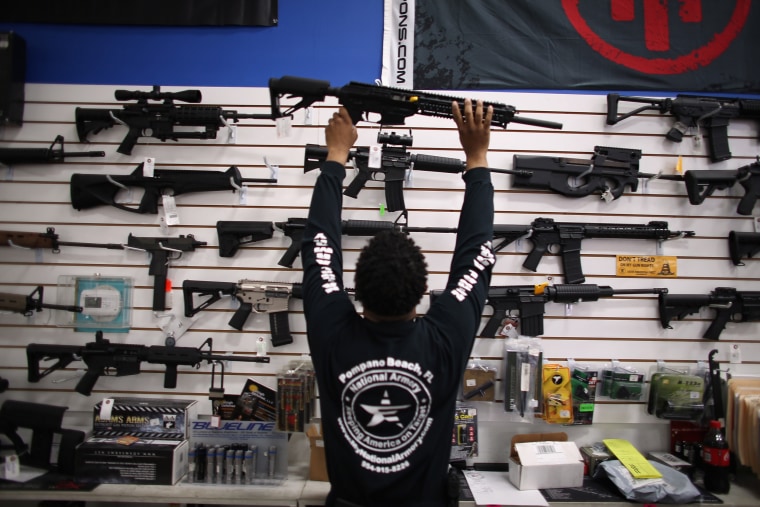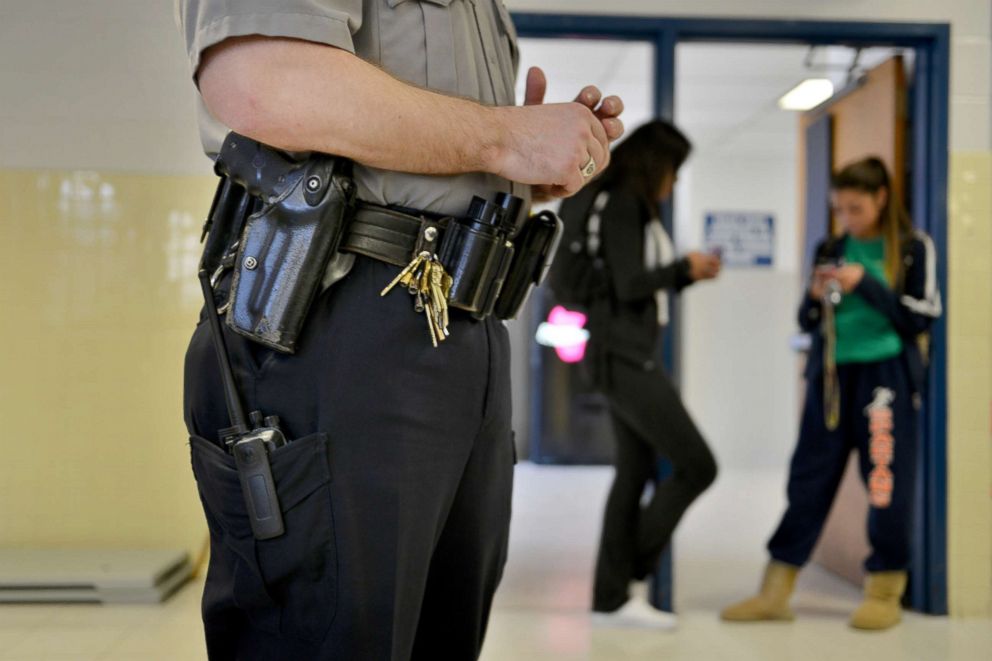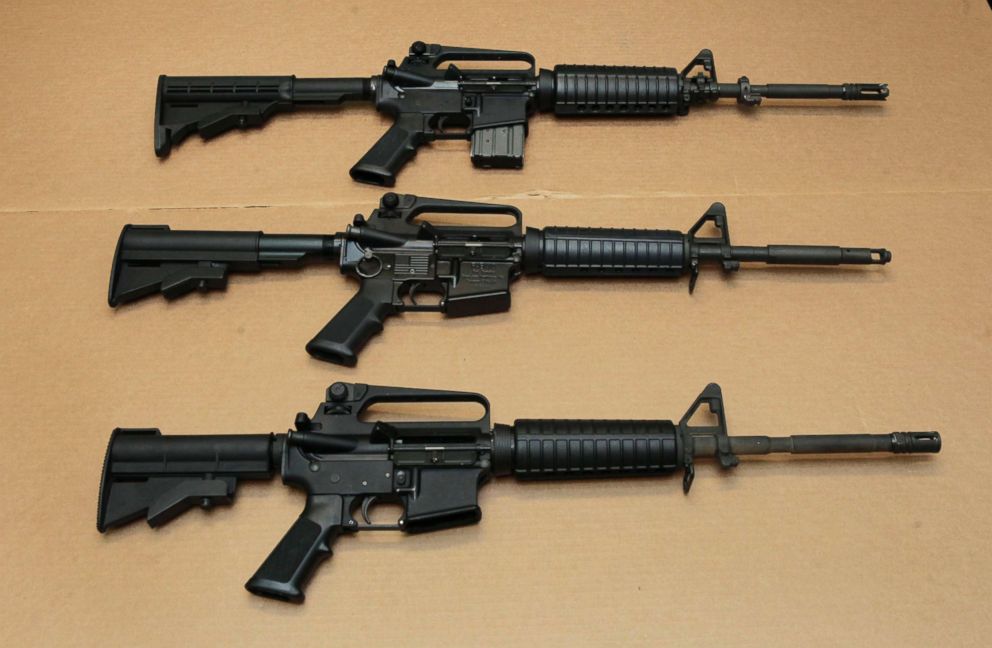Gun Control In America
1 additions to document , most recent almost 7 years ago
| When | Why |
|---|---|
| Nov-02-18 | more information |
LETTERS
Inspired by the Activism of Emma González
Two young women write about school shootings and how they have energized students into political action.

To the Editor:
“Advice From a Young Activist,” by Emma González (Sunday Review, Oct. 7), is so incredibly powerful to me, and reminds me of the fear brought by all the school shootings. I remember the chilling conversations with my friends about what we would do if there were a shooting in school, how we would feel if we had to hide for our lives in the corner of a classroom.
I am tired of having to worry about my little sister’s safety in her elementary school. I am tired of being doubted in conversations regarding gun control because I am “too young to know enough about it.” If I am old enough to worry about being shot in my class, I am old enough to say I want gun control.
Emma González’s and her classmates’ activism gives hope to students like me, showing us that we can be heard, too. They are so brave to fight so hard for what they believe in, and they have inspired many young adults.
It’s heartbreaking that they had to go through such a traumatizing event to gain the platform they have now, but so many have joined the movement so that no one else would have to see the empty chairs of students whose lives were stolen.
Emma Caraus
Chicago
The writer is a freshman at DePaul University, as is Ms. Morgan (below).
They had a class assignment to write letters in response to a Sunday Review article.
To the Editor:
Emma González tells the truth about activism. I’m 18. I’ve marched more times than I can count. I’ve failed classes as a result of spending so much time organizing with my peers and my community. I’ve made more phone calls to the government than to my best friend. Organizing is powerful. Yet every time I look at the news I break down again. Another shooting, another family torn apart, another sexual assaulter in power. Sometimes I cry. It’s O.K. to cry.
What is not O.K. are the people who still don’t care about or pay attention to politics. The people who can turn a blind eye to the injustice in American society. It is less than one month from the midterm elections. I’m voting for the first time, and I hope the candidates I choose will do the good things I hope for. But if they fail I will be there to tell them to do better and hold them to it.
Activists aren’t looking for a pat on the back. We are looking for fundamental societal change. We are crying for it.
Mara Morgan
Chicago
_________________________________________________What is gun control? Everything you need to know
What is gun control and the controversy around it? The root of the gun control debate stems from a single sentence in the Second Amendment of the U.S. Constitution

A man puts a weapon on display at the National Armory gun store on April 11, 2013, in Pompano Beach, Florida.Joe Raedle / Getty Images file
________________________________________________
Gun Control In America: Why This Time It Could Be Different
Jeremy Ghez is a Professor of Economics and International Affairs at HEC Paris

One would be forgiven for thinking that the gun control debate has not changed much over the years. After all, this tragedy is the latest in a very long series of mass shootings in the US where there’s been an average of about one school shooting a week since 2013.SHUTTERSTOCK
The latest massacre at the Parkland, Florida high school is triggering the usual reactions and heated debates on both sides of the political aisle in the US. On one side, proponents of gun control argue that the February 14 mass shooting provides additional proof — if needed — that without significant limits on an individual’s ability to acquire a gun, these tragedies are bound to occur again and again. On the other, proponents of gun rights insist on the importance of heightened security measures to protect schools. They argue that a gun free zone is a bull’s eye for would-be mass murderers and that the only way to stop them is to arm the “good guys”.
An Old Debate In A New Political Landscape
One would be forgiven for thinking that this debate has not changed much over the years. After all, this tragedy is the latest in a very long series of mass shootings in the US where there’s been an average of about one school shooting a week since 2013. Why should the 17 killed at Marjory Stoneman Douglas High School change the deal? The status quo has been maintained in spite of so many gun-related attacks. Many believe the most plausible scenario at this point is for this very same status quo to remain the reality of the land in the near future.
And yet, such a view overlooks the very apolitical nature of the discontent that is being expressed in the United States. This is not only with regards to Florida’s St. Valentine’s massacre but, more broadly, it reflects the repeated attacks on yesterday’s established orders over the past 18 months. Indeed, Donald Trump’s election win is a revealing symptom of this discontent, in particular on the right, but also beyond. Trump also managed to transcend the traditional divide by appealing to blue collar workers who were particularly fed up with the established order which has, in their eyes systematically failed to respect its promises of protection. This promise of protection is at the heart of “Trumpism”: protect everywhere, at home and abroad. At home, with policies to protect and develop not only jobs and infrastructure, but also “paradise” suburbs and safe neighborhoods like Parkland. And abroad, by protecting US borders with significant increases of the defense budget).
In a nutshell, the paradox of “Trumpism” is that it entails being as protective as a Democrat in the domestic arena and as hawkish as a Republican in the international arena. In his first State of the Union address in January, the President, captured this pragmatic approach in a striking way when he argued that, in his own words, “(his) duty, and the sacred duty of every elected official in this chamber, is to defend Americans — to protect their safety, their families, their communities, and their right to the American Dream.”
Trumpism Goes Beyond A Conservative Revolution
This hybrid philosophy could explain the paradoxical proximities between President Trump’s advocates and some movements and figures that seem antithetical on paper. Let’s take Steve Bannon, the disgraced former Trump advisor, for instance. Despite no longer being in the White House he remains a major Trumpism theorist. The former Breitbart News executive chairman sees in Dallas Mavericks owner Mark Cuban a possible continuation of Trumpism. Cuban is a serial entrepreneur whose social liberalism and libertarianism could represent an additional challenge to the established political order. Bannon is reportedly pushing the American businessman to run for president in 2020.
Added November 02, 2018 at 2:05pm
by Yulisa Padilla
Title: more information
5 common reasons lawmakers don't change gun laws
In the wake of another deadly mass shooting, politicians, victims, and advocates are calling for reforms to America's gun laws - but proposals to expand background checks or ban certain types of guns typically don't get very far.
Here’s a look at five common reasons lawmakers say they don’t support such efforts and some facts behind the issues:
“It’s not about guns - it’s about mental health”
President Donald Trump and other Republicans have said efforts to prevent future mass shootings should focus on mental health and a new ABC News/Washington Post pollfound that 77 percent of Americans say better mental-health monitoring and treatment could have prevented the shooting in Parkland last week.
But research does not support a link between being diagnosed with a mental health disorder and an increased risk of committing a violent crime, according to experts in the field.
Daniel Webster, director of the Center for Gun Policy Research at Johns Hopkins University, said that talking about "mental health" alone is way too broad.
"Mental illness when you think very broadly affects nearly 1 in 5 adults, it encompasses so many different things and its way too large of a net to cast to say everybody with a mental health problem is violent or likely to be violent," he said Tuesday.
Current federal regulations say that anyone who has been involuntarily committed to a mental institution or found not guilty of a crime by reason of insanity cannot legally possess a firearm. Fewer than 5 percent of gun-related killings between 2001 and 2010 were committed by people diagnosed with a mental illness at the time, according to a 2015 National Institutes of Health article.
Webster said that while there have been some cases of people with a mental illness committing mass shootings — and have received heightened attention in the media and by lawmakers — that doesn't mean everyone with such disorders are more prone to commit those types of crimes.
Past behavior is a better predictor of whether someone will be violent in the future, he said.
As a result, it would be difficult to create a policy solution that would predict who could commit a violent crime like the mass shooting in Parkland last week.
"Let's improve access to mental health care, let's improve access let's do that, let's get troubled kids access to the services they need," he said. "But lets not fool ourselves that, one, its going to be easy or two, that its going to solve the problem."
Despite the president's comments that mental health is a problem, one of his earliest actions after taking office was to undo a regulation that would have made it more difficult for people with a known mental illness to buy guns.
Nearly a year ago, on Feb. 28, 2017, Trump signed H.J. Res. 40, effectively ending the Social Security Administration's requirement that the names of people who receive mental health benefits be entered into the National Instant Criminal Background Check System.
This is the database the FBI uses to determine who is able to purchase firearms.
“If a bad guy wants a gun, they’ll find a way to get it”
Florida Republican Sen. Marco Rubio said on the Senate floor Thursday that assault weaponsbans didn’t work in the past and wouldn’t work now because there are so many guns already on the street.
“You could pass a law that makes it hard to get this kind of gun in a new condition. But you are going to struggle to keep it out of the hands of someone who has decided that’s what they want to use because there are so many of them out there already that would be grandfathered in,” Rubio said.
The United States boasts the highest number of civilian firearms per capita - 270 million, or 89 guns for every 100 residents, according to Small Arms Survey research published in 2011.
By comparison, Canada has 31 guns per 100 residents, Mexico has 15, and China has five.
Data from professor Michael Siegel at the Boston University School of Public Health suggests that states with a higher percentage of households with guns also tend to have higher-than-average gun homicide rates.
Webster said that the idea that people will always be able to get guns is common because the nation is inundated with news about crimes committed with guns.
But such storylines can be misleading.
"You can always find people that will go to great lengths to get their hands on a gun and carry out what they want to do," he said.
However, research shows that people who commit violent gun crimes do so with weapons that they already had available, he said. Most of these crimes are impulsive.
“It’s too soon to politicize this tragedy”
Some lawmakers have declined to answer questions about the gun control debate in the immediate aftermath of tragedies involving guns because they say it is insensitive to victims and their families to discuss politics so soon after people have been shot or killed.
However, in the immediate aftermath of last week’s shooting students and other survivors have been outspoken about the need for action to prevent future mass shootings and have urged lawmakers to reform gun laws.
Students from Marjory Stoneman Douglas High School traveled to the Florida capitol Tuesday to meet with state lawmakers about gun reform and some are scheduled to come to Washington, D.C. to participate in roundtable discussions at the White House. They have also announced a march on Washington, D.C. next month to call on Congress to act on gun reform.
The president announced Tuesday that he has directed Attorney General Jeff Sessions to draft a rule regulating bump stocks and the White House said several other possible approaches to regulating guns will be discussed in the coming days.
Schools have the "option" to arm teachers
In mass shootings in public places — so called "soft targets" , the conversation often turns to whether churches, schools, or other places where large groups of people gather need to increase security to prevent future incidents.
Education secretary Betsy DeVos told conservative radio host Hugh Hewitt that states clearly have the option to allow teachers to carry guns on campus in an effort to stop future shootings.
"I think this needs to be part of the broader, more robust conversation about how can we avoid these things in the future, and how can we ensure that when my child, your child, goes to school in the morning, they're going to go to a safe and nurturing environment," DeVos said.
 Jahi Chikwendiu/The Washington Post/Getty Images
Jahi Chikwendiu/The Washington Post/Getty Images
But Webster said that it would be a very expensive proposal to arm teachers in every school and that it would mean there are a lot more guns in schools on a daily basis.
"You're putting lethal weapons in a lot of environments and everything we know about increasing access to guns particularly in environments that intersect with youth that generally that's a recipe with disaster," he said.
What about the Second Amendment?
The Second Amendment is often a flash point in conversations about whether the federal government should, or even can, move to restrict access to guns.
After the Las Vegas shooting last October, Reps. Seth Moulton, D-Mass., and Scott Taylor, R-Va., spoke with “This Week” co-anchor Martha Raddatz about different interpretations of the role of the Second Amendment in reducing gun violence.
Taylor said that some changes to gun ownership could be allowed under the Second Amendment but there is a very high bar to “impede on people’s rights.”
Moulton, who served four tours in Iraq while in the Marine Corps, said more “reasonable restrictions” are allowed under the Second Amendment, comparing restricting guns to restricting tanks or land mines.
These different interpretations of the Second Amendment have led to legal challenges against previous laws that attempted to change regulations around guns on the grounds that too much restriction to gun ownership would infringe on the Second Amendment “right to bear arms.”
According to the Second Amendment, "a well regulated Militia, being necessary to the security of a free State, the right of the people to keep and bear Arms, shall not be infringed." Critics argue that the Founding Fathers envisioned an armed militia, not necessarily a population of armed private citizens. But in 2008, in a 5-4 decision, the U.S. Supreme Court declared owning firearms an "individual right."
Writing for the majority Justice Antonin Scalia argued, "It is clear that the Framers . . . counted the right to keep and bear arms among those fundamental rights necessary to our system of ordered liberty."
He also rejected the argument - which he said "bordered on the frivolous" - that the amendment should only apply to the types of weapons in existence during the drafting of the Bill of Rights.
However, the Supreme Court acknowledged that just as the First Amendment does not protect the right to speak for any purpose (for example, people can't yell "fire" in a crowded theater), the Second Amendment does not protect the right "to carry arms for any sort of confrontation," and upheld the government's authority to abridge access to weapons that wouldn't be used for a lawful purpose.
While the Second Amendment could pose a legal hurdle to any federal reform of gun laws, some states have made changes such as increasing the minimum age needed to buy an assault rifle.
What happens now?
Trump says he is working with Congress on a proposal that could address some factors that led to last week's shooting. He announced Tuesday that he has directed the Department of Justice to draft a rule that would ban bump stocks and other devices used to turn legal weapons into machine guns.
Press secretary Sarah Sanders said Monday that the president supports efforts to improve the background check system.
The president spoke with Sen. John Cornyn, R-Texas, about a bill Cornyn has co-sponsored with Sen. Chris Murphy, D-Conn., that aims to ensure that the background check system has up-to-date and accurate information on individuals prohibited from buying firearms under federal law. That bill has been endorsed by the National Rifle Association and other gun rights organizations.
Sen. Dianne Feinstein and 25 other Democrats have sponsored an assault weapons ban billthat would also ban high-capacity magazines, but it has not moved forward in the Senate.
Webster said that research indicates there are other policy solutions that would help reduce violent crime.
He said there is strong evidence that banning people with restraining orders for domestic violence saves lives so lawmakers could make it easier for family members to get an order of protection if their loved one is talking about engaging in violence or amassing an usual amount of weapons of ammunition.
ABC News' Erin Dooley contributed to this report.






0 General Document comments
0 Sentence and Paragraph comments
0 Image and Video comments
Overall, the entire school system is terrified and in constant worry of a possible school shooting. However, the students themselves are the ones most heavily concerned with this issue since they take up the majority of the school, and have close relationships with other fellow students. We should disregard the idea that they are “too young” to be taken serious. Society needs to be more understanding and respectful of their thoughts and beliefs on gun control.
New Conversation
Hide Full Comment
One main reason students hold back on speaking out on this topic, is because they are afraid they won’t be heard or taken seriously. Luckily, thanks to students like Emma Gonzalez, many people are influenced and motivated to take part in advocating for gun control. Through this bravery, more and more people are inspired each day to share their stories and bring attention to the issue.
New Conversation
Hide Full Comment
Through all of the marches, protests, etc, students hope to create a change in the world. They are tired of constantly being congratulated for their work, when still nothing changes. They dedicate a lot of time and hard work towards these social injustices and they expect the same effort back. We need to be less ignorant of these injustices and start putting our words into action.
New Conversation
Hide Full Comment
Ever since the controversy on Gun Control began, there have been two very opposing sides. Due to the single sentence in the second amendment of the U.S. Constitution, some think that there should be restrictions on firearms while others think there shouldn’t be restrictions because it infringes individual liberties. As this is a growing controversy, I think there should be more discussion on it.
New Conversation
Hide Full Comment
The first people restricted from owning guns were black people, Native Americans, and ‘disloyal’ people to the country. New civil rights laws, and assassinations in the 1960’s however, pushed towards more equality on who could own guns. Later, a background check system was created along with other state-level laws which have been used to expand gun rights or to restrict them.
New Conversation
Hide Full Comment
I think it’s important to realize that more and more people are buying guns in America for two reasons. One is because of the increase in public shootings, and two is because people fear more gun control so they are buying more guns before changes occur. This has led an increase in gun sales which has increased total numbers of guns in America, and in each household. However, as seen in a variety of surveys, a majority of people want stricter gun laws.
New Conversation
Hide Full Comment
The increase in school shootings, especially at the Parkland, Florida High School,has caused people to lean ever more towards stricter gun laws, or fewer gun laws. Since there has been an average of one school shooting since 2013, many argue that these mass shootings are proof as to why there should be limits on an individual’s ability to acquire a gun. On the other side, people think more people should own guns as a means of protection. They say “we need to arm the ‘good guys’”.
New Conversation
Hide Full Comment
People fear that nothing on the issue of gun control will change, not even in the future, despite all the mass shootings. The divide on the controversy significantly rose after Donald Trump’s win in the election. His message was to protect everyone, at home and abroad, but some feel that he should focus more on protecting suburbs and neighborhoods. However. he still argues that his ultimate goal is to defend Americans and their right to the “American Dream”.
New Conversation
Hide Full Comment
Steve Bannon was the former Trump advisor, but he remains a major Trumpism theorist. Mark Cuban is also a continuation of Trumpism. He challenges the established political order. Bannon wants Cuban to be president in 2020.
New Conversation
Hide Full Comment
One main reason that lawmakers won’t create stricter gun laws is because they think there are “better” ways to fix the problem. They believe that if we improve access to health care then there would be less people committing these crimes. However, they also argue that not everyone with a mental illness will be more likely to be a criminal. It just depends on their specific situation so it’s important to give them the resources they need to live better and safer lives.
New Conversation
Hide Full Comment
Many lawmakers find it pointless to create stricter gun laws that will keep people from obtaining guns because there are already many guns out on the streets. If someone wanted to commit a crime using a gun, they could easily get it from someone else who has already purchased a gun in the past. There is no realistic way of taking guns away from everyone who has already bought them. Studies show that more gun homicides are inevitable when there are more guns.
New Conversation
Hide Full Comment
Lawmakers also argue that teachers have the option to carry around guns at school so there shouldn’t be stricter gun laws. However, they also realize that putting gun in a place of youth could be a recipe for disaster. It would put many more people in contact with guns on a daily basis.
New Conversation
Hide Full Comment
General Document Comments 0

